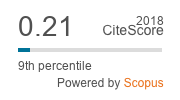Structural Validity of the School Aspirations Questionnaire (SAQ)
DOI:
https://doi.org/10.1590/0102.3772e3438Palabras clave:
Validity, Psychological instrument, Self-determination theory, Perceptions, ValuesResumen
The self-determination theory claims that three basic needs (autonomy, relatedness, and competency) guide the human motivation. This theory serves as background for many psychological instruments. However, no one differentiates the students’ occurrence perceptions and students’ values about the basic needs. The School Aspirations Questionnaire has this goal, but its structural validity was not investigated yet. The present study evaluated the structural validity of the questionnaire. The sample was composed by 716 middle and high school students from a private school in Belo Horizonte, Brazil. A model was tested. This model possessed eight correlated latent variables representing, in terms of values and occurrence perceptions, the three basic needs and the immediate pleasure domain. The model showed good data fit, permitting the conclusion that the questionnaire is capable of distinguishing in the school context the values and the occurrence perceptions about the basic needs, as well the immediate pleasure domain.
Descargas
Citas
Black, A. E., & Deci, E. L. (2000). The effects of instructors’ autonomy support and students’ autonomous motivation on learning organic chemistry: A self-determination theory perspective. Science Education, 84(6), 740-756. doi: 10.1002/1098-237X(200011)84:6<740::AID-SCE4>3.0.CO;2-3
Byrne, B. M. (2001). Structural equation modeling with AMOS: Basic concepts, applications, and programming. Mahwah: Lawrence Erlbaum Associates.
Chen, B., Vansteenkiste, M., Beyers, W., Boone, L., Deci, E. L., Van der Kaap-Deeder, J., Verstuyf, J. (2015). Basic psychological need satisfaction, need frustration, and need strength across four cultures. Motivation and Emotion, 39(2), 216-236. doi: 10.1007/s11031-014-9450-1
Cronbach, L. J., & Meehl, P. E. (1955). Construct validity in psychological tests. Psychological Bulletin, 52(4), 281-302.
Deci, E. L., & Ryan, R. M. (1985). Intrinsic motivation and self-determination in human behavior. New York: Plenum.
Deci, E. L., & Ryan, R. M. (2000). The “what” and “why” of goal pursuits: Human needs and the self-determination of behavior. Psychological Inquiry, 11(4), 227-268. doi: 10.1207/S15327965PLI1104_01
Deci, E. L., & Ryan, R. M. (2016). Optimizing students’ motivation in the era of testing and pressure: A self-determination theory perspective. In L. W. Chia, J. W. C. Keng, & R. M. Ryan (Eds.), Building autonomous learners: Perspectives from research and practice using self-determination theory (pp. 9-29). London: Springer.
Early, D. M., Rogge, R. D., & Deci, E. L. (2014). Engagement, alignment, and rigor as vital signs of high-quality instruction: A classroom visit protocol for instructional improvement and research. The High School Journal, 97(4), 219-239. doi: 101353/hsj.2014.0008
Gomes, M. A. M., & Boruchovitch, E. (2015). Escala de motivação para a leitura do ensino fundamental: Construção e validação. Psicologia: Reflexão e Crítica, 28(1), 68-76. doi: 10.1590/1678-7153.201528108
Guimarães, S. E. R, & Boruchovitch, E. (2004). O estilo motivacional do professor e a motivação intrínseca dos estudantes: Uma perspectiva da teoria da autodeterminação. Psicologia: Reflexão e Crítica, 17(2), 143-150. doi: 10.1590/S0102-79722004000200002
Hagger, M. S., & Chatzisarantis, N. L. D. (2016) The trans-contextual model of autonomous motivation in education: Conceptual and empirical issues and meta-analysis. Review of Educational Research, 86(2), 360-407. doi: 10.3102/0034654315585005
Marsh, H. W., Morin, A. J. S., Parker, P. D., & Kaur, G. (2014). Exploratory structural equation modeling: An integration of the best features of exploratory and confirmatory factor analysis. Annual Review of Clinical Psychology, 10, 85-110. doi: 10.1146/annurev-clinpsy-032813-153700
Muthén, L. K., & Muthén, B.O. (1998-2014). Mplus users's guide. Los Angeles: Muthén & Muthén.
Ryan, R. M., & Connell, J. P. (1989). Perceived locus of causality and internalization: Examining reasons for acting in two domains.Journal of Personality and Social Psychology, 57(5), 749-761. doi: 10.1037/0022-3514.57.5.749
Silva, M. N., Marques, M. M., & Teixeira, P. J. (2014). Testing theory in practice: The example of self-determination theory-based interventions. The European Health Psychologist, 16(5), 171-180. doi: 10.1186/1479-5868-9-20.
Tao, W. (2008). Using the score-based testlet method to handle local item dependence (Doctoral dissertation). Lynch School of Education, Boston College, Department of Educational Research, Measurement, and Evaluation.
Vallerand, R. J., Pelletier, L. G., Koestner, R. (2008). Reflections on self-determination theory. Canadian Psychology, 49(3), 257-262. doi: http://dx.doi.org/10.1037/a0012804
Walker, C. O., Winn, T. D., & Lutjens, R. M. (2012). Examining relationships between academic and social achievement goals and routes to happiness. Education Research International, 2012, 1-7, doi: 10.1155/2012/643438.



